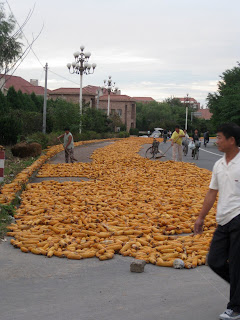We heard a lot about China and Beijing before we arrived. To wit:
Beijing is big. Yep, no argument there. Taking a cab to the subway and riding it all the way across town (standing the whole way) and I've got a good idea of what "big" means. Really, really big.

There are a lot of people in China. Again, DUH. The subway ride where Ava was standing by me and I couldn't see her because it was so so so so so so crowded is a clue. There are always people everywhere. Tanzania was that way, too, but here you see less young adults and kids just standing or hanging. Lots of older folks, but more people are working. The same differences in personal space exist here, too, that we dealt with in Tanzania, so people pushing, not lining up the way we expect, and standing really close are common.
Beijing is dirty. Um, yes and no. Walking around the city, given the number of people and the pace of development, is really pretty clean (children and dogs pooing and peeing on the ground notwithstanding). Subways are clean, there's little grafitti, there's lots of green spaces, and apparently that's the norm and not just something whipped into shape for the Olympics.

Of course, it's what you can't see that's probably killing us. Words can't describe the haze that is over the city all. the. time. I always think it must be getting ready to rain or getting dark, but it's the haze. A clear blue day is fantastic and the number of people that comment on it over and over are an indication of how rare that is. The clear(er) days are apparently the result of Olympic cleanup and so they may go by the wayside in the next few weeks. We do need to invest in air purifiers for the house (they are not cheap) but it really is gross to think what you're breathing in. When you stop to think about it, which I try not to.

People in China smoke. Oh yeah. In fact, I heard that the number of people that smoke in China is greater than the population in the US. Given the total number of people in China, however, I don't know if that's a big percentage. Certainly more people smoke than in Tanzania, where so many couldn't afford (cigarettes could be bought one at a time) and where it was seen as almost sinful behavior. Certainly more people are more obvious about smoking than in the US, where smoking is banned in so many places. It is taking us awhile to get used to eating in restaurants that are fully enclosed after our al fresco meals in Arusha, but we have not been bothered by people smoking at all.

People in China spit. That's one I heard a lot. Given the aforementioned pollution and smoking, people probably do have some gunk they need to hawk out. I haven't been spat upon, or even near, though, and I definitely would notice that. So not a big deal.
Chinese is a difficult language to learn. YOU. HAVE. NO. IDEA. Really, you don't. Unless you're actually taking Chinese. And don't give me any of that "well, it can't be that hard since a billion people have apparently mastered it" nonsense. As a brief primer lesson and what I've learned from trying to help Noah with his Chinese lessons...There are the Chinese characters which do not correspond to letters, but more to words or ideas. When you learn the characters you learn why the character represents that word or idea. The order of the strokes for making the character is important. To write a character out of order would be akin to writing the word "hello" but writing the "o" first, then an "l", then an "h" and so on. It just woudn't make sense.

Then there's pinyin. That's the system of spelling the words in our alphabet and using the tonal marks to indicate pronunciation. Once you learn what different letters and combinations are you can have a go at something. Very few signs are in pinyin, though, but I think it's essential to learning the language.
Then, there's speaking. Chinese is very regular with some aspects that cut you some slack--like a lack of tenses, no articles, no distinguishing between he/him and she/her. How kind of them, because the 4 tones are what makes Chinese especially difficult and they are difficult to hear and reproduce. They also cut across our own tones and ways we emphasize words and end sentences. Needless to say, we've progressed very little beyond "hello" and "thank you." Good thing my phrase book and dictionary give the English, pinyin, and Chinese characters for each word because my ayi doesn't understand any of my attempts to speak Chinese. Also, "to speak Chinese" is a bit inexact. There are a huge number of variations that really can't be considered dialects, because they are distinct enough that someone speaking one can't communicate with someone speaking another. Mandarin is what is spoken here, but in Shanghai and Hong Kong for example, it's Cantonese. So when I asked my student in class (whose family is from Hong Kong) could he speak Chinese, he replied, "no, but I can speak Cantonese."
We are realizing how much flexibility we had in our first months in Tanzania to get out and see life. Here, with both of us working and living in a compound we feel like we haven't been anywhere yet! I carry my camera everywhere, but I'm really falling down on the picture taking! We have the first week of October off for the mid-Autumn holidays and are going someplace each day so keep tuning in!

















































